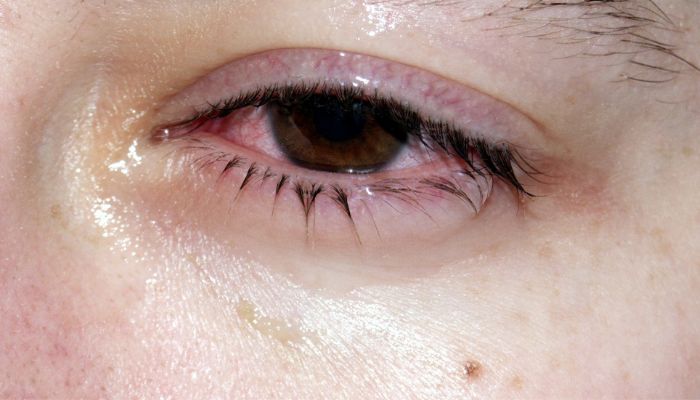Common eye problems in humans develop due to a variety of factors, including age, genetics, environmental factors, and underlying health conditions. Age-related vision problems such as cataracts and macular degeneration can occur due to the natural aging process and are more common among the elderly.
Certain conditions of vision problems can be inherited genetically. Also, environmental factors can cause eye problems, such as too much sun or blue light from digital devices. Additionally, underlying health conditions, like diabetes or hypertension, can also lead to vision problems.
Cataract

In cataract the transparent eye lens yellows, hindering the passage of light rays through it making the vision hazy, cloudy, or blurry. The lens becomes completely opaque causing blindness if the patient does not get treated.
Prevention and Causes
Although cataract which is one of the most common eye Problems in humans, develops in older adults it can occur at any time of life. If the patient does not get treated, the lens will cause blindness by becoming completely opaque. Diet rich in vitamin C and E and the carotenoid lutein may slow the progression of this disorder.
- Top Causes : Aging, hereditary factors, certain medical conditions like diabetes, high blood pressure, prolonged exposure to sunlight, smoking, poor nutrition, certain medications, such as steroids, eye injuries or diseases, such as glaucoma and uveitis
- Prevention: Avoid direct exposure to ultraviolet (UV) radiation, such as wearing sunglasses and a hat when outdoors, to prevent cataracts; additionally, eat a healthy diet with plenty of fresh fruits and vegetables, quit smoking, and avoid excessive drinking.Wearing eye protection when playing sports and avoiding contact sports can also help to prevent cataracts. Additionally, controlling blood pressure, cholesterol, and blood sugar levels can help to prevent cataracts. Regular eye exams are also essential for early detection and treatment of cataracts.
Macular degeneration

Eye disorder macular degeneration is gradual, painless deterioration of the macula (central retina tissue). Blurring of the central vision is the first symptom of this disease. This disorder’s cause is not known. Recent studies suggest that a diet high in antioxidants may prevent or slow down the disorder.
Prevention and Causes
Antioxidants lutein & zeaxanthin may help. Food sources incl. corn, peas, broccoli, kale, Swiss chard, water cress, green leafy veg. & egg yolk. Eat a diet rich in zeaxanthin (greens, red peppers, corn) to lower the risk of macular degeneration. Eating fish once a week may also help to lessen the risk associated with high saturated fat intake.
- Top Causes: Age-related macular degeneration (AMD), genetic mutations, smoking, high blood pressure, obstructive sleep apnea, excessive alcohol consumption, chronic inflammation, ultraviolet light exposure, high cholesterol, poor diet and nutrition.
- Prevention: Wearing sunglasses with UV protection, eating a diet rich in fruits and vegetables, especially those containing carotenoids like lutein and zeaxanthin, regular physical activity, quit smoking, regularly visiting an eye doctor and having a comprehensive eye exam, wearing protective eyewear, taking supplements containing vitamins and minerals, such as lutein and zeaxanthin.
Diabetic retinopathy

Diabetic retinopathy is a complication of diabetes and a leading cause of vision loss. It occurs when high blood sugar levels cause damage to the blood vessels in the retina, which is the light-sensitive tissue at the back of the eye. In the early stages of diabetic retinopathy, the damaged blood vessels can leak fluid or bleed into the eye, leading to blurred vision. As the condition progresses, abnormal new blood vessels can form on the surface of the retina, leading to scarring and loss of vision.
Prevention and Causes
If left untreated, diabetic retinopathy can lead to complete blindness. Treatment options include laser therapy, medication, and surgery.
- Top Causes: High blood sugar levels over a long period of time.
- Prevention: Control your blood sugar levels. In fact, high blood pressure can worsen diabetic retinopathy, so keeping your blood pressure under control is important for preventing the condition. Also, regular exercise can help you maintain healthy blood sugar and blood pressure levels, which can help to prevent diabetic retinopathy. Smoking can worsen diabetic retinopathy, so it’s important to quit if you’re a smoker. Eating a balanced diet that is low in sugar and saturated fat can help to reduce your risk of diabetic retinopathy.
Night blindness

This deficiency disease caused by the deficiency of vitamin A is rare in western world but it still exists in many underdeveloped countries due to poor diet and less knowledge about the disease. In this disease the patient faces difficulty in seeing well in dim or insufficient light. The impaired ability of eyes to adapt to darkness leads to night blindness or poor night vision.
Prevention and Causes
- Top Causes: The causes may be vitamin A deficiency or inability to utilize it properly.
- Prevention: Vitamin A in the body can be helpful if it gets converted from Beta-carotene. Sources of beta-carotene are dark yellow or orange fruits and vegetables such as carrots, sweet potatoes, apricots, papaya, and dark green leafy vegetables. Organ meat, dairy products, fortified butter margarine are some good source of vitamin A.
Conjunctivitis

Commonly called pink eye refers to the inflammation of the thin transparent membrane covering the front of the eye. Among the most common eye problems in humans, it spreads from person to person through direct contact. Due to this disease the eye ball and underside of the eye lid becomes inflamed. Proper treatment is necessary as this could be due to some viral infection or an allergic reaction.
Prevention and Causes
- Top Causes: It is usually caused by one of three things: an infection, an allergic reaction, or something irritating the conjunctiva. A bacterial or viral infection causes infective conjunctivitis, an allergic reaction to something like pollen causes allergic conjunctivitis, and something like a loose eyelash or other foreign object irritating the conjunctiva causes irritant conjunctivitis.
- Prevention: To keep eye disorder away consume plenty of carrots, sweet potatoes, citrus fruits, broccoli, fatty fish and dairy products. Keeping sea food, poultry, meat, beans for zinc and leafy greens, corns, peas, pepper for leutin and zeaxanthin in your diet also improve your eye health and keep your eye healthy to make you see everything clearly.

Lifebing is driven by an unrelenting passion for promoting health and well-being, our team is wholly committed to curating exceptional content and immersive experiences.
